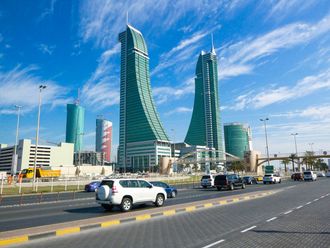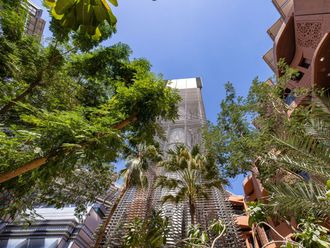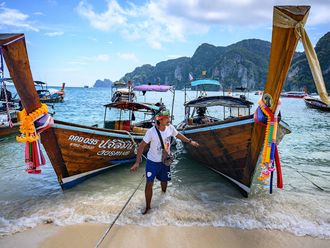
Manama: Bahrainis will long recall 2009 with a mixture of merriment and frustration as their country commemorated 10 years under the rule of King Hamad Bin Eisa Al Khalifa, but their national squad miserably missed the qualification for the World Cup finals by a few minutes.
Now, they look forward to 2010 with anticipation for more political and parliamentary achievements, but with concerns about a possible increase in fuel charges.
King Hamad came to power in March 1999, following the death of his father the late Amir Shaikh Eisa Bin Salman Al Khalifa. He launched a series of wide-sweeping political, social and economic reforms and revived parliamentary life following a three-decade hiatus.
The state was turned into a constitutional monarchy with a bicameral parliament that allowed the election of 40 MPs to the lower chamber and the appointment of a largely liberal upper chamber that includes ten women, a Christian and a Jew.
The ten years of power were celebrated with great fanfare in December, coinciding with the National Day and the Accession Day.
Bahrainis kept dreaming about a possible qualification for the World Cup finals to be held in South Africa in June 2010. Following a series of matches in the qualifying matches, they earned the right to play against Saudi Arabia in the penultimate round.
A hair-raising qualification in the last seconds in Riyadh enabled the team to play against New Zealand with the winner flying to South Africa.
The first match in Manama ended in a goalless draw while, in the second match, Bahrain had a second half penalty, minutes before the final whistle. But Bahrain missed it and the dream was shattered. An eerie silence enveloped the nation and many openly and ashamedly cried in the places where people had gathered to celebrate the historic moment.
It was the second time in four years that Bahrain missed the qualification by a few minutes.
In their last session in 2009, Bahrain’s MPs launched a vitriolic attack on a probable decision to raise fuel charges by 20 per cent.
News of the possible increase were first published by a local media, prompting lawmakers to condemn it as a leak by the government, saying that it should have informed the parliament instead.
The finance and oil ministers were called in by the MPs to explain the situation. However, neither minister confirmed or denied the report, fuelling the anger of the lawmakers who decided to write a letter to Prime Minister Shaikh Khalifa Bin Salman Al Khalifa for the final government decision on the issue.
Some angry MPs said that they would move the street if the government went ahead with the new charges, arguing that it would compound a difficult situation for many families with limited income and would even dramatically reduce the middle class, the backbone of society.
Now, the parliament hopes that the government would deny the fuel allegations and that 2010 would be more friendly.
However, the parliament will definitely change, even if partially. Legislative elections are scheduled for October 2010 amid hope, mainly among liberals and women, that new and less conservative faces and more female MPs will represent them in the new-look lower chamber.
Leading societies have said that they would contest in the polls, and many sitting MPs said that they would “respond to the wishes of their constituents” and would run again. Religious societies said that they might consider choosing female candidates on their lists, but have put forward no names, reinforcing the skeptical view that they would not keep their promises.
None of the women candidates won in 2002, the first time elections were held, and only one woman, Lateefa Al Gaood, won in 2006 after her opponent withdrew. Bahrainis hope that the rumours that around 20 women are expected to announce their candidacy within the next few months would become sweet facts.












